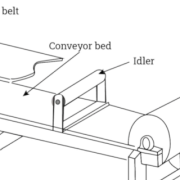Top Roller Conveyor Parts Suppliers: Rollers, Pulleys & Components
In the realm of material handling, roller conveyors stand out as a fundamental component, streamlining the movement of goods across various sectors including manufacturing, warehousing, and distribution. These systems play a crucial role in enhancing operational efficiency, reducing manual labor, and minimizing handling times. However, the effectiveness and reliability of roller conveyors heavily depend on the quality and compatibility of their parts. This is where roller conveyor parts suppliers come into the picture, offering a critical service to businesses aiming to maintain or improve their conveyor operations. Sourcing the right parts from reputable suppliers ensures that conveyor systems run smoothly, reducing downtime and prolonging the life of the equipment. The significance of choosing the right suppliers cannot be overstated, as it directly impacts the operational efficiency, safety, and bottom line of businesses relying on roller conveyors for their daily operations.
Basic Knowledge of Roller Conveyor Parts Suppliers
Roller conveyors are a fundamental component of material handling systems, designed to facilitate the easy and efficient transport of goods across a facility. Understanding the basic principles of how roller conveyors work, as well as the differences between their main types, is crucial when selecting equipment for your material handling needs. This knowledge is particularly valuable when sourcing components, as roller conveyor parts suppliers play a critical role in ensuring the reliability and performance of these systems.
Description of Roller Conveyors and Their Working Principles
Roller conveyors utilize a series of cylindrical rollers to move goods across a flat or slightly inclined surface. These rollers rotate around a fixed axis, providing a smooth pathway for items to travel along. The design and operation of roller conveyors can vary, but the basic principle involves using gravity or mechanical power to move items.
There are two primary types of roller conveyors: gravity roller conveyors and powered roller conveyors. Gravity roller conveyors rely on the force of gravity to move items down a decline or along a level surface with manual assistance. In contrast, powered roller conveyors use electric motors to propel items along the conveyor path, offering greater control and efficiency for moving goods.
The Difference Between Gravity Roller Conveyor and Power Roller Conveyor
The table below highlights the key differences between gravity roller conveyors and powered roller conveyors, providing insights that are useful when discussing options with roller conveyor parts suppliers:
Understanding these differences is crucial when working with roller conveyor parts suppliers to ensure that you select the right type of conveyor for your specific application. Whether your operation requires the simplicity and cost-effectiveness of a gravity roller conveyor or the advanced capabilities of a powered roller conveyor, consulting with knowledgeable suppliers can help you make an informed decision.
Moreover, roller conveyor parts suppliers offer valuable advice on maintenance, customization options, and upgrades, ensuring that your conveyor system remains efficient and reliable over time.
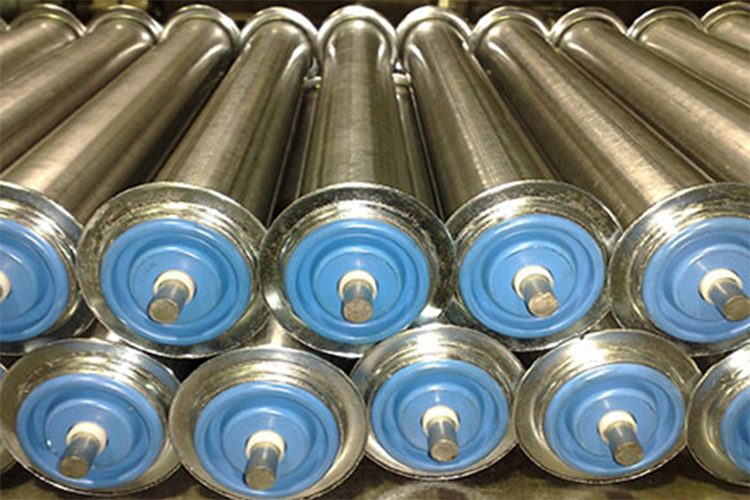
roller conveyor parts suppliers
Select Roller Conveyor Parts Suppliers
Selecting the right roller conveyor parts suppliers is a critical decision that can significantly influence the efficiency, reliability, and cost-effectiveness of your material handling systems. When choosing a supplier, several key factors should be taken into account to ensure that you receive high-quality parts that meet your specific operational requirements.
Factors to Consider When Selecting a Supplier
Quality and Compatibility: The quality of the parts is paramount. High-quality components are less likely to fail, reducing downtime and maintenance costs. Ensure the supplier offers parts that are compatible with your existing systems to avoid operational disruptions.
Range of Products: A supplier with a wide range of products can be a valuable partner, especially if you operate different types of roller conveyors. This variety ensures that you can source all necessary parts from one supplier, simplifying procurement processes.
Technical Support and Service: Look for suppliers that offer robust customer support, including technical advice, installation assistance, and after-sales service. This support can be crucial in solving unexpected issues and optimizing the performance of your conveyor systems.
Delivery Time and Reliability: Timely delivery of parts is essential to minimize downtime. Evaluate the supplier’s delivery policies and reliability. Check their track record and customer reviews to gauge their ability to meet deadlines consistently.
Cost: While cost should not be the sole determining factor, it’s important to ensure that the pricing is competitive and offers good value for the quality and service provided. Consider the total cost of ownership, including the lifespan of the parts and any associated maintenance expenses.
Benefits of Local Suppliers for Immediate Needs
For businesses with immediate or urgent needs, local roller conveyor parts suppliers can offer several advantages. Proximity allows for faster delivery times, reducing the waiting period for parts and, consequently, downtime. In situations where a part needs to be replaced quickly to resume operations, local suppliers can be the difference between a minor hiccup and a significant operational setback.
Moreover, working with local suppliers can facilitate easier communication and the possibility of in-person visits to discuss needs or solve complex issues. This close relationship can lead to better understanding and service tailored to your specific requirements. Local suppliers may also offer emergency services or expedited delivery options that are not feasible with distant suppliers.
Selecting the right roller conveyor parts suppliers involves a careful assessment of several factors, including quality, product range, support, delivery, and cost. Local suppliers can provide additional benefits for businesses with immediate needs, offering faster delivery and personalized service. By considering these aspects, businesses can establish a reliable supply chain that supports the efficient and uninterrupted operation of their roller conveyor systems.
Heavy Duty Roller Conveyor Parts Suppliers
Heavy-duty roller conveyors are the backbone of many industrial applications, designed to withstand the rigors of high-volume, high-impact environments. These systems are crucial for transporting heavy loads across various industries, including manufacturing, warehousing, and distribution. The necessity of heavy-duty components cannot be overstated, as they ensure the reliability, efficiency, and longevity of the conveyor system. Identifying roller conveyor parts suppliers that specialize in heavy-duty parts is therefore essential for maintaining the operational standards required in such demanding settings.
Necessity of Heavy Duty Components for Industrial Applications
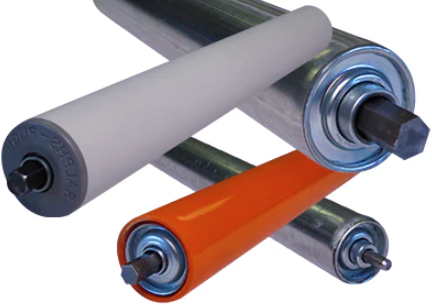
Heavy-duty roller conveyor systems are engineered to handle larger and heavier loads than their standard counterparts. This capability is not just about moving heavy items from point A to point B; it’s about doing so reliably over extended periods, often in harsh conditions. Heavy-duty components are built with more robust materials, enhanced designs, and superior manufacturing processes. They offer several key advantages:
- Durability: Designed to endure continuous operation under heavy loads, these components resist wear and tear, reducing downtime and maintenance requirements.
- Efficiency: High-quality heavy-duty parts ensure smooth operation, minimizing energy consumption and optimizing throughput.
- Safety: The strength and reliability of heavy-duty components contribute to a safer working environment by reducing the risk of breakdowns and accidents.
How to Identify Suppliers That Specialize in Heavy-Duty Parts
When sourcing components for heavy-duty roller conveyors, it’s critical to identify suppliers with the expertise and inventory to meet the demands of industrial applications. Here are several criteria to help identify these suppliers:
- Industry Reputation: Look for suppliers known within the industry for quality and reliability. Recommendations from other businesses or industry associations can be invaluable.
- Product Range: Suppliers specializing in heavy-duty parts typically offer a wide range of components designed for various industrial applications. This diversity is a good indicator of their expertise.
- Material Quality: Heavy-duty parts are often made from higher-grade materials capable of withstanding extreme conditions. Suppliers should be transparent about the materials used in their products.
- Customization Capabilities: The ability to customize components to meet specific operational requirements is a hallmark of a specialized supplier. Custom solutions may be necessary for unique applications or to enhance efficiency.
- Technical Support and Services: Suppliers of heavy-duty parts should provide comprehensive technical support, from product selection to post-installation services. This support is crucial for ensuring the correct application and maintenance of the components.
- Certifications and Standards: Look for suppliers whose products meet or exceed industry standards and who can provide certifications as evidence of their commitment to quality.
Working with the right roller conveyor parts suppliers is critical for businesses that rely on heavy-duty conveyor systems. These suppliers not only provide the high-quality components necessary for industrial applications but also offer the expertise and support to optimize the performance and reliability of your conveyor system. By carefully selecting a supplier that specializes in heavy-duty parts, businesses can ensure the longevity and efficiency of their material handling operations, ultimately contributing to their bottom line.
Integrated Roller Conveyor Parts Suppliers System
In the dynamic world of material handling and logistics, the efficiency and reliability of conveyor systems are paramount. An integrated roller conveyor system, encompassing both gravity and powered options, represents a comprehensive solution tailored to meet the diverse needs of various industries. This system combines the simplicity and cost-effectiveness of gravity conveyors with the precision and power of motorized conveyors, offering an adaptable and efficient method for moving goods.
Manufacturers and roller conveyor parts suppliers play a crucial role in the development and implementation of these integrated systems. They not only provide individual components but also offer complete, end-to-end solutions designed to optimize the flow of materials within a facility. These suppliers work closely with clients to understand their specific requirements, including the type of materials being handled, the volume of goods, and the layout of the facility, to design a conveyor system that maximizes efficiency and productivity.
Advantages of Dealing with a Supplier That Provides the Entire System
Customization and Compatibility: One of the key benefits of working with suppliers that offer complete integrated roller conveyor systems is the ability to receive a customized solution that is fully compatible with your operations. These suppliers have the expertise to design systems that integrate seamlessly with your existing processes, ensuring smooth and efficient material flow. Customization can range from the selection of conveyor types to the integration of advanced control systems that manage the entire operation.
Simplified Procurement and Installation: Dealing with a single supplier for the entire system simplifies the procurement process, as there is no need to coordinate with multiple vendors for different parts of the conveyor system. This not only streamlines the purchasing process but also ensures that all components are designed to work together flawlessly, reducing potential compatibility issues. Furthermore, a single supplier is responsible for the installation of the entire system, ensuring a cohesive setup process and minimizing delays.
Comprehensive Support and Maintenance: Suppliers that provide complete conveyor systems typically offer comprehensive after-sales support and maintenance services. This holistic approach to customer service means that you have a single point of contact for any issues or needs that may arise, from technical support to replacement parts. This can significantly reduce downtime and ensure your operations continue to run smoothly.
Cost Efficiency: While the initial investment in an integrated system might be higher than purchasing individual components, the long-term benefits often outweigh the upfront costs. A system designed to work as a cohesive unit is more efficient, reduces waste, and requires less maintenance over time. Additionally, dealing with a single supplier can offer cost benefits in terms of bulk purchasing and reduced shipping costs.
An integrated roller conveyor system provides a streamlined, efficient, and adaptable solution for material handling needs. Working with a supplier that can provide the entire system, from design to installation and support, offers significant advantages in terms of customization, procurement, support, and cost efficiency. These benefits make it an attractive option for businesses looking to optimize their operations with a reliable and effective conveyor system.

Manufacturers and Rental Services of Roller Conveyor Parts Suppliers
When it comes to acquiring roller conveyor systems, businesses face the critical decision of whether to purchase outright from roller conveyor parts suppliers or to opt for leasing options. Both manufacturers and rental services offer unique advantages and potential drawbacks, depending on the specific needs and circumstances of the business. Understanding these factors is crucial for making an informed decision that aligns with operational goals and budget constraints. Below, we explore the pros and cons of buying versus leasing from roller conveyor parts suppliers, presented in a comparative table, and discuss scenarios where each option may be more suitable.
Advantages and Disadvantages of Buying vs. Leasing
The following table outlines the primary advantages and disadvantages of purchasing and leasing roller conveyor systems from parts suppliers:
Scenarios Where Long-Term Purchase or Short-Term Rental Are More Suitable
Long-Term Purchase: Purchasing roller conveyor systems from parts suppliers is generally more suitable for businesses with stable, ongoing operational needs where the conveyor system will be used in a permanent installation. This option is ideal for companies that:
- Have a high volume of goods to transport on a regular basis.
- Require customized conveyor solutions tailored to specific operational needs.
- Aim to build equity in their equipment over time and are prepared to handle maintenance and repairs.
Short-Term Rental: Leasing or renting equipment from roller conveyor parts suppliers may be more appropriate for businesses that:
- Face seasonal peaks in demand and only need additional conveying capacity for a limited period.
- Want to avoid the high upfront costs associated with purchasing and prefer to manage cash flow more effectively.
- Prefer to test out different conveyor systems before committing to a purchase.
- Need to stay flexible and adapt to rapidly changing technology or operational requirements.
The decision to buy or lease from roller conveyor parts suppliers depends on several factors, including financial considerations, operational needs, and long-term business strategies. Manufacturers and rental services each offer distinct benefits, and the right choice will vary based on the specific circumstances and objectives of the business. By carefully evaluating these factors, businesses can select the most cost-effective and operationally efficient approach to integrating roller conveyor systems into their operations.
Specialized Roller Conveyor Parts Suppliers
In the vast and varied field of material handling, the demand for specialized conveyor solutions that cater to unique industrial requirements has led to the emergence of roller conveyor parts suppliers who excel in providing motorized and customized solutions. These suppliers, with their focus on innovation and customization, enable businesses to optimize their operations with systems tailored to specific needs. Taking GRAM conveyor as an illustrative example, we delve into how these specialized suppliers operate and the benefits they bring to industries requiring precision and efficiency in their conveyor systems.
Focus on Suppliers of Motorized Roller Conveyors: GRAM Conveyor Example
GRAM conveyor, a leading name among roller conveyor parts suppliers, stands out for its extensive range of motorized roller conveyors designed to offer efficiency, durability, and automation in material handling processes. Motorized roller conveyors, unlike their gravity-operated counterparts, provide the advantage of controlled movements of goods, enabling precise speed regulation, positioning, and integration with various stages of the production and packaging processes. GRAM conveyor excels in offering solutions that are not only reliable but also incorporate advanced features like variable speed options, reversible operations, and integration capabilities with other automated systems.
These motorized systems are ideal for industries where timing and placement precision are critical, such as in the pharmaceutical, food and beverage, and manufacturing sectors. By automating the movement of goods, these conveyors reduce manual handling, minimize the risk of damage or errors, and significantly enhance operational efficiency.
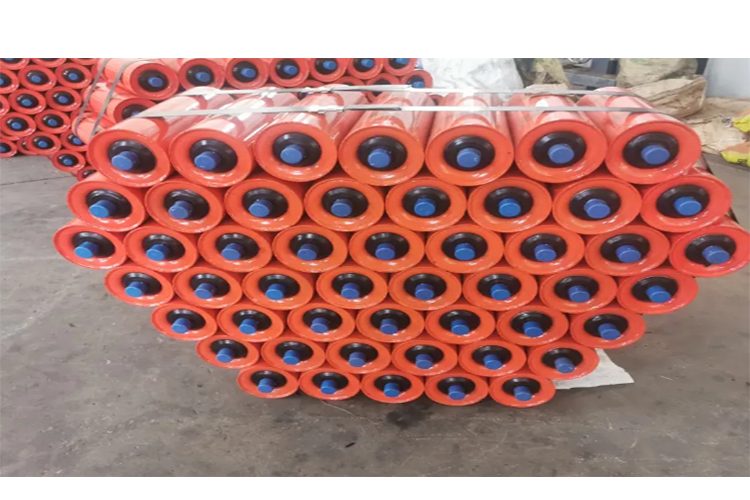
GRAM Conveyor
Customized Options Available for Specific Industry Needs
What sets specialized suppliers like GRAM conveyor apart is their commitment to customization. Recognizing that no two industries or operations are alike, these suppliers offer customized solutions that cater to the unique requirements of each client. This customization can range from the design and materials used in the conveyor belts to the integration of specific functionalities like sorting, merging, and diverting systems.
For instance, the food and beverage industry requires conveyors that are easy to clean and made with materials safe for food contact. Suppliers adept in customized solutions can provide conveyors with stainless steel components and food-grade belts. Similarly, industries dealing with heavy or bulky items might need conveyors with reinforced structures and high-torque motors to ensure smooth and safe transportation of goods.
The process of customization typically begins with a detailed analysis of the client’s operational needs, including load requirements, space constraints, and desired throughput. From there, suppliers like GRAM conveyor utilize their engineering expertise to design a system that meets these specifications while also considering future scalability and integration with existing operations.
The collaboration with a specialized supplier for motorized and customized roller conveyor solutions offers businesses the opportunity to enhance their material handling processes significantly. By leveraging the expertise of suppliers like GRAM conveyor, companies can benefit from a conveyor system that is not just a part of their operations but a strategic asset that drives efficiency, safety, and productivity.
Key Components of Roller Conveyor from Roller Conveyor Parts Suppliers
Roller conveyors are integral to the smooth operation of many industrial, warehousing, and distribution processes. Understanding the core components that make up these systems is crucial for maintenance, troubleshooting, and when consulting with roller conveyor parts suppliers for upgrades or replacements. This section delves into the in-depth aspects of essential roller conveyor components, including conveyor roller bearings, covers, mounting brackets, and GRAM brand conveyor pulleys, highlighting their functions and significance.
Conveyor Roller Bearings
Roller bearings are pivotal in ensuring the smooth and efficient rotation of the conveyor rollers. They are designed to withstand both radial loads (perpendicular to the shaft) and axial loads (parallel to the shaft), enabling the conveyor to move goods with minimal friction and resistance. High-quality bearings are crucial for the longevity and reliability of the conveyor system, reducing downtime and maintenance requirements. When selecting bearings from roller conveyor parts suppliers, consider factors such as load capacity, speed requirements, and environmental conditions (e.g., exposure to dust or moisture).
Conveyor Roller Cover
The roller cover, often made from materials like polyvinyl chloride (PVC), polyurethane, or rubber, is designed to provide a protective layer over the conveyor roller. This cover serves multiple purposes: it reduces noise levels, increases grip to prevent slippage of materials, and minimizes wear on both the rollers and the goods being transported. Depending on the application, roller covers can vary in thickness, hardness, and surface texture. Roller conveyor parts suppliers can offer a range of cover options tailored to specific operational needs, such as temperature resistance or anti-static properties.
Conveyor Roller Mounting Bracket
Mounting brackets are used to secure the rollers to the conveyor frame, providing stability and alignment. These components are essential for maintaining the structural integrity of the conveyor and ensuring smooth operation. Mounting brackets come in various designs and materials, including steel and aluminum, to match different load requirements and environmental conditions. Adjustable brackets, offering flexibility in roller height and angle, are also available for specialized applications. It’s important to consult with roller conveyor parts suppliers to select the appropriate mounting brackets that match the specifications of your conveyor system.
GRAM Conveyor Brand Conveyor Pulleys
GRAM brand conveyor pulleys are recognized for their durability and performance, playing a key role in the driving mechanism of powered roller conveyors. These pulleys are attached to the motor and gearbox, transferring power to the rollers and enabling the conveyor to move goods along its length. Available in various sizes and configurations, GRAM pulleys are designed to accommodate different belt widths and speed requirements. When working with roller conveyor parts suppliers, specifying the right pulley size and material is crucial to ensure optimal efficiency and longevity of the conveyor system.
What is the key components of roller conveyors is essential for anyone involved in the maintenance, operation, or procurement of these systems. Each component plays a critical role in the overall performance and reliability of the conveyor. By working closely with reputable roller conveyor parts suppliers, businesses can ensure they select high-quality components that meet their specific operational needs, ultimately enhancing productivity and reducing downtime.
After-Sales Parts and Service
The significance of after-sales parts and service cannot be overstated in the context of maintaining the operational efficiency and longevity of roller conveyors. Roller conveyor parts suppliers play a pivotal role in ensuring that businesses have access to essential aftermarket parts and services, which are crucial for routine maintenance, repairs, and upgrades. Such support not only helps in minimizing downtime but also in preserving the conveyor system’s efficiency over its lifespan. A standout example of excellence in after-sales parts and service is provided by GRAM conveyor, which offers a comprehensive suite of services tailored to meet the ongoing needs of its clients.
The Role of Aftermarket Parts in Maintenance and Efficiency
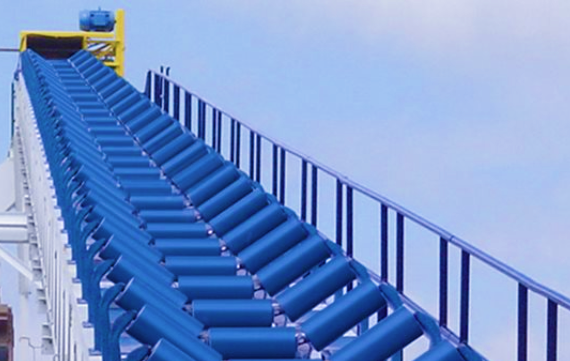
Aftermarket parts from reputable roller conveyor parts suppliers are essential for maintaining the performance and reliability of conveyor systems. These parts are typically manufactured to meet or exceed the original equipment manufacturer’s (OEM) specifications, offering a cost-effective alternative to OEM parts without compromising on quality or performance. The availability of a wide range of aftermarket parts enables businesses to perform timely maintenance and repairs, thereby avoiding the potential costs and disruptions associated with system failures.
Moreover, the use of high-quality aftermarket parts can lead to improvements in the efficiency and functionality of conveyor systems. For instance, upgrading to parts with advanced materials or designs can reduce wear and tear, enhance energy efficiency, or increase the system’s capacity. Roller conveyor parts suppliers that stock a comprehensive inventory of aftermarket parts ensure that businesses can quickly obtain the components they need, keeping their operations running smoothly.
Services such as Engineering Support and Machine Shop Services Provided by GRAM Conveyor
GRAM conveyor distinguishes itself not only through its inventory of aftermarket parts but also through its value-added services, including engineering support and machine shop services. Engineering support is crucial for identifying the optimal parts and modifications necessary to meet specific operational goals or to address challenges. GRAM conveyor’s team of engineers works closely with clients to assess their needs, recommend solutions, and oversee the implementation of these solutions to ensure they deliver the desired outcomes.
Machine shop services complement engineering support by providing the capability to customize parts or fabricate unique components that may not be readily available. This service is invaluable for businesses operating older or specialized conveyor systems for which standard parts may not fit or for those seeking to enhance their system with custom modifications. GRAM conveyor’s machine shop services enable rapid turnaround on custom parts, minimizing downtime and ensuring that the conveyor system is tailored precisely to the business’s requirements.
The after-sales parts and service provided by roller conveyor parts suppliers are critical components of a comprehensive material handling strategy. Suppliers like GRAM conveyor, with their focus on aftermarket parts, engineering support, and machine shop services, offer businesses the resources and expertise needed to maintain, repair, and optimize their conveyor systems efficiently. This support not only ensures the longevity and reliability of the conveyor system but also enhances its performance, contributing to the overall productivity and success of the operation.
Roller Conveyor Parts Suppliers Online Marketplace
The advent of e-commerce has transformed the way businesses source industrial components, with the roller conveyor sector being no exception. Online marketplaces have emerged as pivotal platforms where roller conveyor parts suppliers can showcase their products, making it easier for buyers to find and purchase the necessary parts for their conveyor systems. A prime example of this digital shift is the GRAM conveyor company, which has leveraged the power of e-commerce by offering an online parts catalog. This approach not only broadens their reach but also enhances the purchasing experience for customers.
The Role of E-Commerce in the Roller Conveyor Industry
E-commerce platforms have revolutionized the procurement process for roller conveyor parts, providing a seamless connection between suppliers and businesses in need of their products. The online presence of suppliers like GRAM conveyor facilitates immediate access to a comprehensive range of parts, from rollers and bearings to motors and control systems. Their online parts catalog serves as a digital showroom that is accessible 24/7, enabling businesses to browse and purchase components at their convenience.
This shift towards online marketplaces has several advantages. For one, it significantly reduces the time and effort involved in sourcing parts. Customers can easily search for specific components, compare specifications, and verify compatibility with their existing systems without the need for time-consuming consultations or visits to physical stores. Furthermore, e-commerce sites often provide detailed product information, customer reviews, and technical support, enhancing the buyer’s ability to make informed decisions.
Convenience of Comparing Different Suppliers Online
One of the most significant benefits of roller conveyor online marketplaces is the ability to compare different suppliers easily. Customers can evaluate a wide range of factors, including price, quality, delivery times, and after-sales service, all from the comfort of their office or home. This transparency fosters a competitive environment that can lead to better prices and higher-quality products for buyers.
Moreover, online marketplaces offer the convenience of dealing with suppliers from around the globe, expanding the options available to businesses. This global reach is particularly beneficial for finding specialized parts or taking advantage of regional pricing differences. For suppliers like GRAM conveyor, an online presence enables them to compete on a global stage, showcasing their products and services to a worldwide audience.
The introduction of online marketplaces in the roller conveyor parts industry, exemplified by GRAM conveyor’s online catalog, has provided businesses with a more efficient, accessible, and competitive means of sourcing the components they need. This digital evolution benefits both suppliers and buyers, streamlining the procurement process, and ensuring that conveyor systems can be maintained and upgraded with ease.
Conveyor Parts for Sale or Rent from Roller Conveyor Parts Suppliers
In the dynamic world of material handling and logistics, ensuring your conveyor system remains operational and efficient is paramount. Whether for maintenance, upgrade, or temporary expansion purposes, sourcing roller conveyor parts is a critical task. This section explores the avenues for finding roller conveyor parts for sale and discusses how rental services offered by roller conveyor parts suppliers can serve as a cost-effective solution for temporary operational needs.
Where to Find Roller Conveyor Parts for Sale
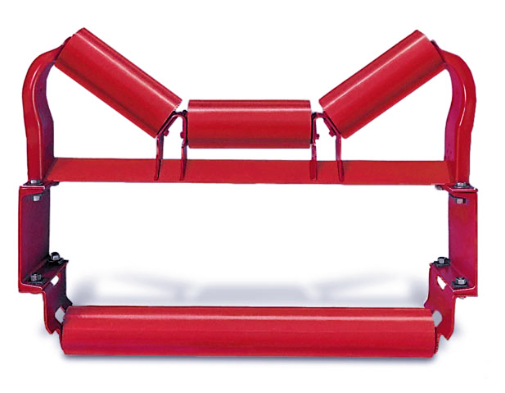
Direct from Manufacturers: One of the most reliable sources for purchasing roller conveyor parts is directly from the manufacturers. These entities often have a comprehensive inventory of parts and accessories designed specifically for their systems. Purchasing directly can ensure compatibility and high-quality components.
Specialized Roller Conveyor Parts Suppliers: There are suppliers in the market specializing in conveyor parts. These suppliers offer a wide range of components from various manufacturers, providing the advantage of a one-stop-shop for all conveyor needs. They can also offer expert advice on part compatibility and alternatives.
Online Marketplaces: With the digital age, finding roller conveyor parts for sale has become more accessible through online industrial and B2B marketplaces. These platforms offer a wide variety of components from different suppliers, including both OEM and aftermarket parts. Online marketplaces can be an excellent source for comparing prices and availability.
Local Dealers and Distributors: Local dealers and distributors often have a network of suppliers and can source parts quickly. Working with a local dealer can reduce shipping times and costs, and they can offer valuable insight into local service providers for installation or maintenance.
Connect with us for superior conveyor roller options.
How Rental Services Can Be a Cost-Effective Solution for Temporary Needs
For businesses facing temporary or seasonal increases in demand, rental services for roller conveyor parts and entire systems can be a highly cost-effective solution. Roller conveyor parts suppliers that offer rental services provide several benefits:
Flexibility: Rental services allow businesses to scale their operations up or down without the long-term commitment or capital investment required for purchasing. This flexibility is crucial for companies with fluctuating demands.
Reduced Capital Expenditure: Renting conveyor parts or systems reduces the need for upfront capital investment, freeing up resources for other strategic investments. It converts a capital expenditure into an operational expense, which can be beneficial for cash flow management.
Maintenance and Support Included: Typically, rental agreements include maintenance and support services, ensuring the rented components remain in optimal condition without additional costs. This aspect can significantly reduce the operational burden on the renting company.
Opportunity to Test Before Buying: Renting offers the chance to test specific parts or configurations in a real-world setting before making a purchase decision. This trial can provide valuable insights into the suitability of certain components for the business’s specific needs.
Availability of Latest Technology: Rental services often offer the latest models and technologies, allowing businesses to benefit from advancements in efficiency and productivity without the need for continual investment in new equipment.
Whether opting to purchase roller conveyor parts outright or taking advantage of rental services, working with reputable roller conveyor parts suppliers is key. These suppliers not only provide access to a wide range of high-quality parts but also offer the expertise and support necessary to make informed decisions. For businesses looking to maintain or enhance their conveyor systems, exploring both purchasing and rental options can lead to cost-effective and flexible solutions tailored to their operational needs.
FAQs about Roller Conveyor Parts Suppliers
A roller conveyor is a versatile material handling system designed to move goods across short or long distances within a facility. It consists of several key components that work together to transport items efficiently. The primary component is the roller itself, which is a cylinder mounted on axles and spaced at regular intervals along the conveyor frame. These rollers can be powered by motors (for automated movement) or unpowered (gravity-fed), relying on manual force or gravity to move items.
The frame holds the rollers in place and provides the structural support for the conveyor. It’s typically made from materials like steel or aluminum, depending on the required strength and the environment it will be used in. The axle connects the rollers to the frame and allows them to rotate. It can be fixed or spring-loaded, the latter allowing for easy removal and replacement of rollers.
Drive mechanisms are included in powered conveyors, consisting of motors and gearboxes that transfer power to the rollers, facilitating the movement of goods. Bearings are critical for smooth roller operation, reducing friction and wear. Additionally, guide rails may be installed along the sides of the conveyor to keep items on track and prevent them from falling off.
Conveyor rollers are manufactured by a wide range of companies specializing in material handling and industrial machinery. These manufacturers vary from large multinational corporations to small and medium-sized enterprises. Some of the well-known companies in the industry include Interroll, Rexnord, and Hytrol, among others. These manufacturers provide a comprehensive range of roller conveyor systems and components, including customized solutions to meet specific operational needs.
The choice of manufacturer often depends on several factors, including the quality of the rollers, the range of products offered, compatibility with existing systems, and after-sales support. Many businesses also consider the manufacturer’s reputation, experience in the industry, and the ability to provide innovative solutions that can enhance the efficiency and reliability of their conveyor systems.
Conveyor rollers come in a variety of sizes to accommodate different applications and load requirements. The diameter of the rollers can vary significantly, with common sizes ranging from as small as 3/4 inch (19 mm) to as large as 8 inches (203 mm) or more. The length of the roller is also variable, designed to match the width of the conveyor belt or items being transported.
The choice of roller size is influenced by factors such as the weight and dimensions of the items, the type of items (solid, loose, etc.), and the desired speed of movement. Larger rollers are typically used for heavier loads or wider conveyors, while smaller rollers are suited for lighter items and more compact systems.
Conveyor rollers are made from a variety of materials, each selected for its specific properties and suitability for different environments and applications. Common materials include:
Steel: Known for its strength and durability, steel rollers are widely used in heavy-duty applications and in environments where the conveyor may be exposed to harsh conditions.
Stainless Steel: Offers corrosion resistance, making it ideal for use in food processing, pharmaceutical, and other clean or corrosive environments.
Aluminum: Lightweight and corrosion-resistant, aluminum rollers are suitable for lighter applications and where noise reduction is a priority.
Plastic: Often used in light-duty applications, plastic rollers can be a cost-effective solution and offer quiet operation. They are also resistant to corrosion and can be used in environments where washdowns are frequent.
Siemens AG: Siemens is a global powerhouse focusing on the areas of electrification, automation, and digitalization. They offer a wide range of conveyor systems known for their efficiency and innovation.
Daifuku Co., Ltd.: Based in Japan, Daifuku is one of the largest material handling equipment suppliers in the world. Their conveyor systems are widely used in automotive, electronics, and food industries.
Honeywell Intelligrated: A subsidiary of Honeywell, Intelligrated provides advanced automation solutions including conveyor systems that improve the productivity and accuracy of material handling processes.
Dematic: Dematic is a global leader in intralogistics, providing a comprehensive range of conveyor systems. Their solutions are known for enhancing operational efficiency and productivity in warehouses and distribution centers.
Interroll Group: Interroll offers innovative conveyor systems and is known for its high-quality rollers, drives, and conveyors. They serve a variety of industries including food, beverage, and pharmaceuticals.
Rollers on a conveyor are cylindrical components that support and guide the belt or other conveying medium, facilitating the movement of materials along the system. They play a critical role in ensuring smooth operation and are available in various types:
Carrying Rollers: These rollers support the weight of the loaded belt and the materials being conveyed, ensuring smooth and efficient transport.
Return Rollers: Positioned on the underside of the conveyor belt, these rollers support the empty belt on its return trip.
Impact Rollers: Located at the loading points, impact rollers absorb the energy from the falling material, protecting the belt and reducing maintenance costs.
Guide Rollers: Used to guide the conveyor belt and keep it in alignment, preventing it from drifting sideways and ensuring efficient operation.
Tapered Rollers: Typically used in curved sections of conveyors, these rollers help maintain a smooth and continuous flow of materials around bends.
Last Updated on June 21, 2024 by Jordan Smith
Jordan Smith, a seasoned professional with over 20 years of experience in the conveyor system industry. Jordan’s expertise lies in providing comprehensive solutions for conveyor rollers, belts, and accessories, catering to a wide range of industrial needs. From initial design and configuration to installation and meticulous troubleshooting, Jordan is adept at handling all aspects of conveyor system management. Whether you’re looking to upgrade your production line with efficient conveyor belts, require custom conveyor rollers for specific operations, or need expert advice on selecting the right conveyor accessories for your facility, Jordan is your reliable consultant. For any inquiries or assistance with conveyor system optimization, Jordan is available to share his wealth of knowledge and experience. Feel free to reach out at any time for professional guidance on all matters related to conveyor rollers, belts, and accessories.


